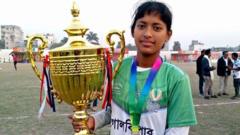The recent cancellations of women's football matches in Bangladesh, attributed to protests from Islamist groups, have sparked concerns over rising extremism and its impact on women's rights and empowerment in the country.
Islamist Threats Derail Bangladeshi Women's Football Matches

Islamist Threats Derail Bangladeshi Women's Football Matches
Rising Islamist extremism in Bangladesh forces cancellations of women's football events, stifling opportunities for female empowerment and sportsmanship.
In a distressing turn for female athletes in Bangladesh, a series of women's football matches have been scrapped due to Islamist protests, raising alarms over the growing influence of extremist groups in the nation. Seventeen-year-old Asha Roy was among the hopeful players looking forward to a tournament in the Rangpur region, before the Islami Andolan Bangladesh issued threats against the event, branding it as un-Islamic.
With police intervention for safety, Asha and her teammates were left disappointed and frightened as they returned home without playing. “We had never faced such a situation before. It was disheartening,” she recounted.
Historically a Muslim-majority nation, Bangladesh has witnessed a wave of political upheaval, leading to a reshuffle in governance that has seemingly emboldened Islamist factions previously sidelined. The cancellation of these football matches marks a troubling trend, as officials reported this was the third time in less than two weeks that women's sporting events had been halted due to similar threats.
In the Dinajpur district, conflicts erupted between Islamist protesters and local supporters of the matches, resulting in injuries. For many young girls like Asha, involvement in sports represents a vital pathway to empowerment and an escape from poverty, with the national women's football team recently celebrating significant achievements in the South Asia Football Championships.
Despite facing threats, Asha’s teammate, 16-year-old Musammat Tara Moni, remains resolute in pursuing her passion for football, expressing hope to represent the national team one day. The teams' coach, Nurul Islam, expressed surprise at the recent turn of events, stating, “In seven years, we have never encountered such hostility.”
The Islamist group's demands include stringent measures impacting female participation in sports, such as requiring full-body coverings for female athletes and limiting spectators to women only. Their leader has openly pushed for the implementation of hard-line Islamic Sharia law in Bangladesh.
The national outrage on social media has prompted authorities to take action, resulting in the reorganization of one of the canceled matches, and a probe into the threats. Government spokesperson Shafiqul Alam dismissed concerns about appeasement towards Islamists, citing numerous successful women’s sporting events earlier this year.
However, the alarm bells are ringing for many observers, as experts like Dr. Tawohidul Haque highlight the limits of surveillance on released extremist groups, a sentiment echoed by women's rights activist Shireen Huq, who fears increased intimidation in public events for women.
As protests against women's rights mount, the government’s recent moves, including the revocation of a ban on a major Islamist party, have only fueled uncertainty. Extremist attacks have surged, targeting not only sports but also cultural events and minority religious practices. Voices from women’s rights groups warn of a potential "Talibanisation" of society if decisive action isn't taken.
While the future remains uncertain, the resilience of young women like Asha and Musammat shows a steadfast determination to reclaim their rights to participate in sports and public life amidst rising challenges. As the situation evolves, Bangladesh’s fight against extremism and for women's empowerment continues.




















